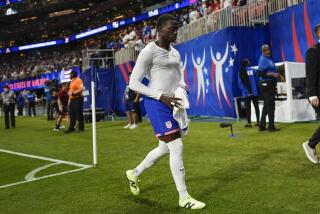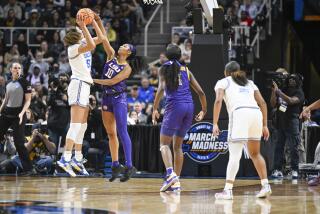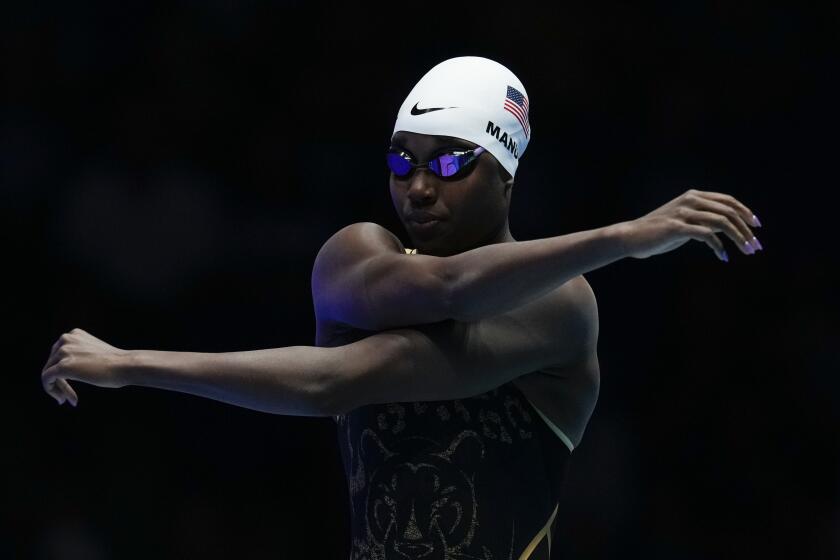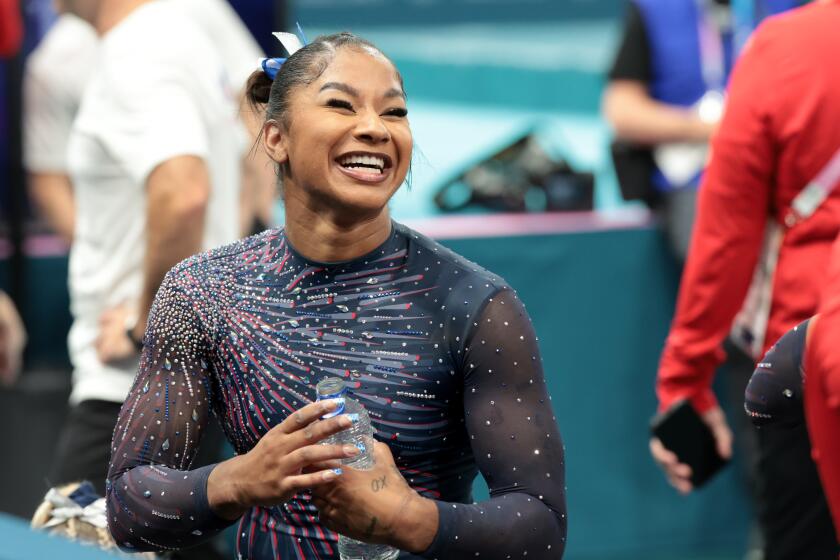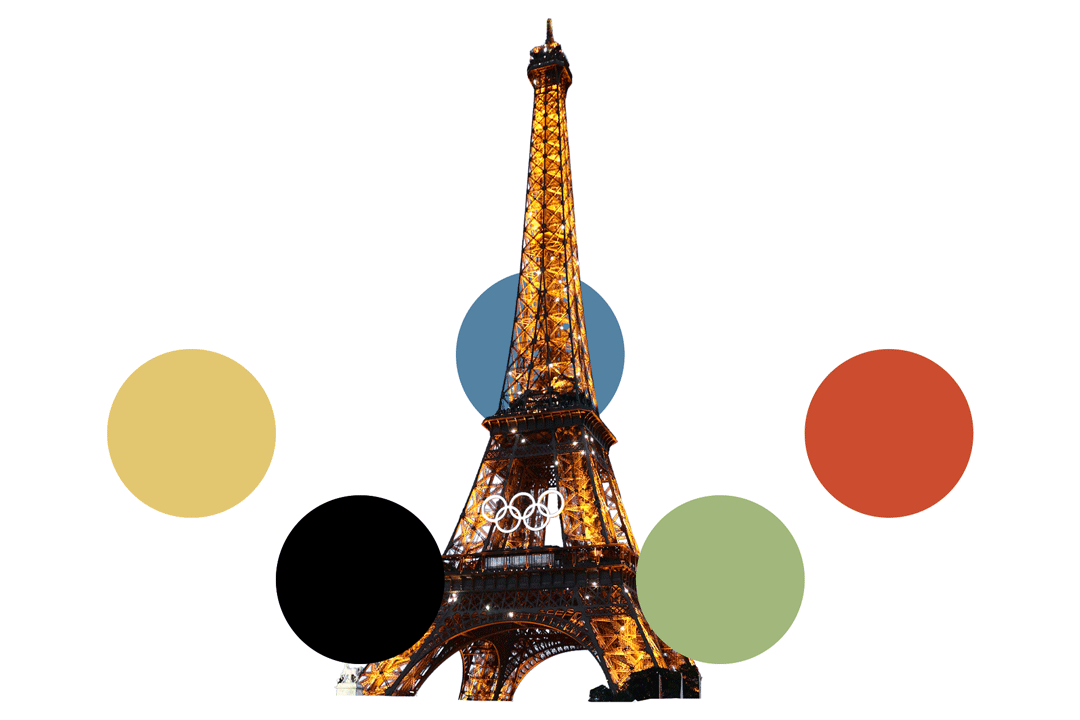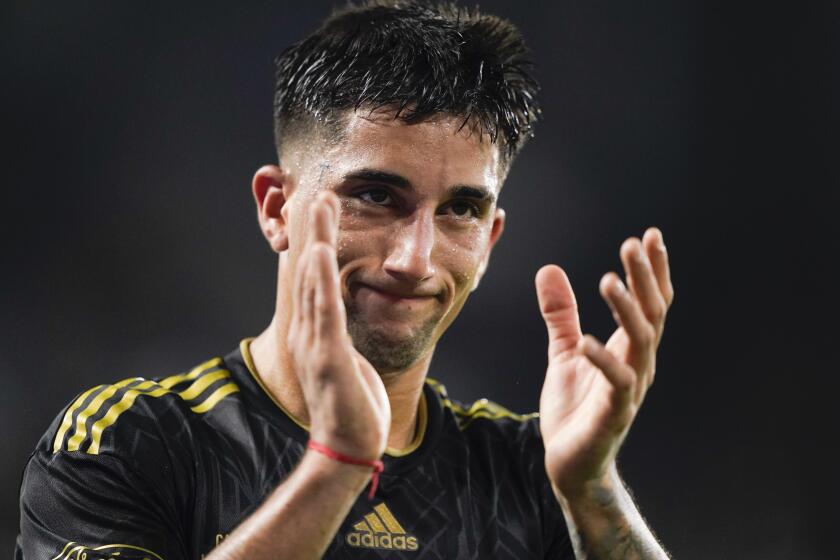Soccer newsletter: Racism remains an issue for the sport

Hello and welcome to another edition of the L.A. Times soccer newsletter. I’m Kevin Baxter, the Times’ soccer writer.
We start with a subject that really shouldn’t be an issue in modern society, much less modern soccer. Yet racism remains as implacable as a morning sunrise.
No country is completely immune but in few places is racism and anti-Semitism as virulent and prevalent as it currently is in Italy. In the first month of the season, Milan’s Romelu Lukaku was targeted for verbal abuse by fans in Cagliari, a match in Parma was suspended when racist chants were heard coming from the crowd and a TV commentator said of Lukaku “the only way to [stop] him is maybe give him 10 bananas.”
Even journalists, who should know better, got into the act with the tabloid newspaper Corriere dello Sport headlining its preview of last Friday’s Milan- Roma game “Black Friday,” placing the words between a picture of Lukaku and Roma’s Chris Smalling, both of whom are black.
“I would go as far as to say it’s an epidemic,” Piara Powar, executive director of Football Against Racism in Europe (FARE), said earlier this year.
Powar places some of the blame on politics and some on weak leadership.
“I think part of the problem in Italy is the rhetoric of the right-wing government. It’s anti-migrant and anti-African and clearly that will always feed into stadiums,” he said. “Then you have a football association that doesn’t know how to respond, given the government’s position, and historically hasn’t responded very well.”
That doesn’t bode well for the immediate future since nationalist, anti-immigrant political movements are growing in size and influence in many places, including the U.S.
Racism, homophobia and anti-Semitism are problems wherever they appear but stadiums may be among the most dangerous places given the number of people, the passion and tribalism of sports, and the presence of alcohol. There are some who say that passion in part of the spectacle; witness the many defenses that have been offered for the anti-gay goal-kick chants that have long marred games in Mexico.
But I’ve always wondered how it feels for the players who are the targets of the racism, homophobia and anti-Semitism. Last week DaMarcus Beasley and Oguchi Onyewu, former U.S. national team players who endured racist taunts and worse while playing in Europe, tried to explain.
“Those things you don’t forget. It hurts,” said Beasley, who was mocked by chants of monkey while playing Champions League qualifiers in Belgrade and Montenegro . “As much as you try to block it out and concentrate on the game it’s in the back of your mind. It’s always in the back of your mind.
“But after the game is where I felt more sad, more angry that it happened. The soccer player, that part is over. Now you’re a human being, a normal person, and it hurts that people see you in a different light just because of the color of your skin.”
While playing in Belgium, Onyewu was targeted with racial slurs by an opponent. On another occasion, while preparing for a throw-in, he was punched by a fan.
“I look at the referee and he’s telling me to play on as if I’m the one that’s crazy. Like ‘Oh get on with it. It’s just nothing,’ ” he said. “That’s a privilege to them that they don’t have to go through it. But the people that have lived it, they understand the severity of an experience like that.”
Beasley fears it won’t be long before players, feeling abandoned by authority figures such as league and team officials and referees, begin taking things into their own hands.
“Something’s going to happen,” he said. “Either the player gets hurt [or] the player literally runs off the field and jumps in the stands. And you never know what fans bring to the stadium. It’s crazy to think that.
“[But] everything is building up so that a reaction is just going to, you know, tip the iceberg. Hope it doesn’t come to that but you don’t know. Somebody actually might get hurt.”
So how can we stop this? Onyewu favors not only stiffer penalties but stricter enforcement of the laws already on the books.
“You need some forward-thinking individuals that can stand up and say ‘OK, enough is enough.’ This team or these fans have a lifetime ban or a heavy fine,” he said. “Not just some slap on the wrist, something significant that will promote them to never do that again.”
In Italy, executives with Milan and Roma – both clubs with U.S. owners – got the other 18 Serie A teams to sign on to a public letter in which they admitted Italian soccer has a chronic racism issue and called on the league to deliver a comprehensive and robust anti-racism policy, stricter laws and a plan for educating those within the game about the scourge of racism.
That’s probably wishful thinking given that the letter urges the league to act when, for years, Serie A, through action and inaction, has largely enabled the racist epidemic in Italy. Paul Rogers, the chief strategy officer for Roma, who was instrumental in composing the letter, recently admitted as much.
“Italian football has been soft on racism for far too long and that is not something we are prepared to accept any more. In 2019, it shouldn’t need a football club to tell anyone that making monkey noises or racist comments to black players is unacceptable,” he said.
So Roma acted on its own earlier this season, banning a fan from its games after he racially abused Brazilian defender Juan Jesus on social media.
“I can’t comment on whether we were the first Italian team to openly denounce a supporter’s racist behavior towards a player but I do know for a fact that we were the first Italian club to take it upon our self to ban a fan from the stadium for a racist act,” Rogers said.
Manchester United took similar action, ejecting a supporter from Old Trafford after he made racist comments during a game with Liverpool in October. But not all clubs are as committed to the cause so it will fall to players, officials and fans to force change.
And there have been some positive signs on that front. Last month a team of 10-year-olds north of Milan played with black streaks on their faces to support a teammate who was subject to racist taunts from an opponent’s mother (read that again: a 10-year-old boy was subject to racist taunts from a parent).
In France, referee Clement Turpin stopped a match for 10 minutes and ordered both teams to their dressing rooms when Nice fans refused to take down homophobic banners. In Mexico, at least two Liga MX games were halted this fall when fans persisted in making anti-gay chants.
“These things must not happen,” Roma’s Edin Dzeko said. “We’re all equal. I’m Bosnian and you’re from a different country, but it doesn’t matter.
“To tell you the truth, I don’t understand it. I’ve played with so many players in so many different countries. We’re all brothers. I don’t know what’s in these people’s heads. If you’re that way inclined, stay at home. You’re not needed at the stadium.”
However those who do go to the stadium may be the most effective agents for change. Consider this story about a group of German fans who took things into their own hands several seasons back.
“When I came to the stadiums in the ’90s, you had a lot of right-wing people. In Munich, the culture was open to right-wing things,” said Simon Mueller, a Bayern Munich supporter.
Mueller’s group wanted to make the stadium more hospitable for families and children but knew that simply banning people would backfire. So they came up with a different strategy, adopting the legacy of former club president Kurt Landauer.
A Jewish holocaust survivor, Landauer was not a favorite of right-wing fans but his role in rebuilding the club after World War II couldn’t be questioned even by the biggest haters.
“It’s important that he was Jewish,” Mueller said.
So the Schickeria, an independent supporters’ union not affiliated with the club, began showing up for games in Landauer t-shirts and waving banners with his face on them.
“When the fans in the stands do something and the TV cameras show it, the whole country takes notice,” Mueller said. “The fans are saying, ‘this man is important.’
“The idea of Kurt Landauer, what he stands for now, is very important. But for me it’s important what he means for the people in the stands. It’s important for us not to go back to right-wing ideas.”
Soon the homophobic and anti-Semitic remarks that once plagued Bayern Munich games ceased and now, in the largest stadium in the city that gave rise to the Nazis, racism is no longer a problem. (Here’s a deeper look at Landauer and his legacy from the archives.)
And if that can work in Munich, there’s no reason why it can’t also work in Milan, Moscow, Mexico City and Montenegro.
Read more on this topic by clicking here.
Galaxy add a piece to the puzzle
The Galaxy’s offseason makeover continued last week when the team reached agreement on a contract with free-agent midfielder Sacha Kljestan.
Kljestan, 34, an Orange County native, wanted to end his MLS career in Southern California and his signing fills the gap in depth and versatility created when Chris Pontius, another Southern Californian, retired.
Kljestan made 52 appearances for the U.S. national team and has played for three MLS teams, debuting with Chivas USA in 2006 and spending the last two seasons in Orlando City. He had a goal and three assists in 23 games last season. Terms of the deal were not released but Kljestan will take a cut in pay from the $1.1 million he made in 2019.
In the last month the Galaxy, in addition to losing Pontius, have parted ways with their two leading scorers from last season in Zlatan Ibrahimovic (30 goals) and Uriel Antuna (six goals) as well as winger Favio Alvarez, whose three scores tied for third-best on the team. Also leaving were defenders Dave Romney and Diego Polenta.
MLS home openers
Speaking of MLS, the league will open its 25th season in February with the Galaxy playing on the road in Houston on Feb. 29 while LAFC will start at home a day later, facing David Beckman’s Inter Miami in the expansion club’s first competitive game.
The February openers are the earliest in league history.
The Galaxy will play its first home game on March 7, playing host to the Vancouver Whitecaps.
Following is the list of all 26 team’s home openers. The full 2020 schedule will be announced later.
Saturday, Feb. 29: D.C. United vs. Colorado Rapids (Audi Field); Montreal Impact vs. New England Revolution; Houston Dynamo vs. Galaxy (BBVA Stadium); San Jose Earthquakes vs. Toronto FC (Avaya Stadium); FC Dallas vs. Philadelphia Union (Toyota Stadium); Orlando City SC vs. Real Salt Lake (Exploria Stadium); Nashville SC vs. Atlanta United (Nissan Stadium); Vancouver Whitecaps FC vs. Sporting Kansas City (BC Place)
Sunday, March 1: Columbus Crew SC vs. NYCFC (MAPFRE Stadium); New York Red Bulls vs. FC Cincinnati (Red Bull Arena); Seattle Sounders FC vs. Chicago Fire FC (CenturyLink Field); LAFC vs. Inter Miami CF (Banc of California Stadium); Portland Timbers vs. Minnesota United (Providence Park)
Saturday, March 7: New England Revolution vs. Chicago Fire FC (Gillette Stadium): Real Salt Lake vs. New York Red Bulls (Rio Tinto Stadium): Toronto FC vs. New York City Football Club (BMO Field): Atlanta United vs. FC Cincinnati (Mercedes Benz Stadium); Sporting Kansas City vs. Houston Dynamo (Children’s Mercy Park); Colorado Rapids vs. Orlando City SC (Dick’s Sporting Goods Park); Galaxy vs. Vancouver Whitecaps FC (Dignity Health Sports Park)
Saturday, March 14: NYCFC vs. FC Dallas (Yankee Stadium); Inter Miami CF vs. Galaxy (Inter Miami CF Stadium in Fort Lauderdale); FC Cincinnati vs. D.C. United (Nippert Stadium); Philadelphia Union vs. San Jose Earthquakes (Talen Energy Stadium)
Sunday, March 15: Minnesota United vs. New York Red Bulls (Allianz Field)
Saturday, March 21: Chicago Fire FC vs. Atlanta United FC (Soldier Field)
Quotebook
“It’s ridiculous that we are still talking about racism. There’s only one race, and that’s the human one. I appreciate the stance my club has taken.”
Roma midfielder Lorenzo Pellegrini on his club’s no-tolerance policy regarding racist actions from fan
Until next time
Stay tuned for future newsletters. Subscribe here, and I’ll come right to your inbox. Something else you’d like to see? Email me. Or follow me on Twitter: @kbaxter11.
More to Read
Go beyond the scoreboard
Get the latest on L.A.'s teams in the daily Sports Report newsletter.
You may occasionally receive promotional content from the Los Angeles Times.

